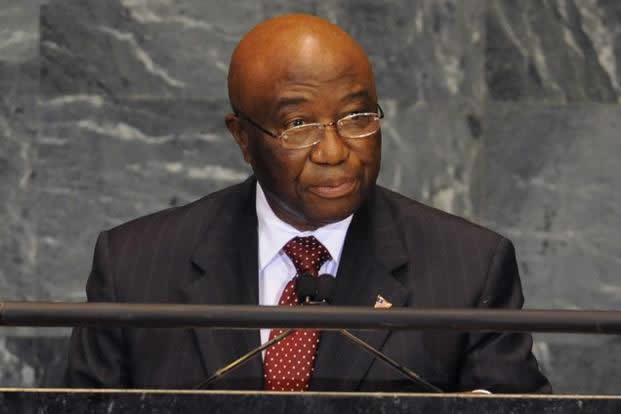Joseph Boakai will be sworn in as Liberia’s president today, following his election victory over former football star, George Weah, with the challenge of tackling poverty and corruption.
The 79-year-old narrowly beat former Ballon d’Or winner Weah in November’s run-off poll with 50.64 per cent of the votes to 49.36 per cent.
Weah conceded defeat in November 2023.
He will be sworn in for a 6-year term during a ceremony in parliament in the capital Monrovia from 10:00 am (1000 GMT) in the presence of several foreign leaders and diplomatic delegations.
Boakai has 40 years of political experience already behind him.
He was vice-president from 2006 to 2018 under Liberia’s first woman president, Ellen Johnson Sirleaf, before being soundly beaten by Weah in the 2017 election.
November’s poll in the West African country was peaceful in a region that has seen a succession of military coups in recent years in Mali, Burkina Faso, Guinea and Niger.
But the small nation of five million has been plagued with corruption, high level of poverty and a weak justice system, after years of civil war and an Ebola outbreak.
Impunity related to crimes committed during those civil wars is another unresolved issue.
Backed by ex-warlord,
Boakai aligned himself with local barons during his election campaign, including former warlord Prince Johnson.
Johnson, who enjoys strong support in the northeastern Nimba County, backed Weah in 2017.
Johnson was also famously seen drinking a beer in a video while his men tortured to death, former president Samuel Doe.
He has nominated one of his associates, Jeremiah Koung, as Boakai’s vice-president.
Johnson himself is under US sanctions.
Given his long career in politics, Liberians expect Boakai to create jobs, improve the economy, strengthen institutions and fight corruption — which was one of his key campaign pledges.
“Expectations of Boakai’s presidency are high,” Larry Nyanquoi, a former local official in Nimba County, told AFP.
Boakai is “seen as somebody who has not engaged in corruption and one who has tried to live the simplest possible life.”
Liberians also expect Boakai to ensure a stable supply of electricity and water, and to improve the road infrastructure to attract investment, Nyanquoi said.
The out-going government did not live up to its commitment to ensure the rule of law, to establish a war and economic crimes court, and to end impunity in the country.
The mysterious deaths of four government auditors also raised suspicions.
“Every leader has promised to crack down on corruption and they have failed, so he has to say something different,” Abdulla Kiatamba said.
Kiatamba, an analyst at Geo Baraka Group of Strategists, said of Boakai: “They have promised improved economic conditions and they have also failed so he has to say and do something that will be different.”
Boakai now faces the tricky challenge of accommodating all those who supported his election campaign when he starts distributing jobs, analysts say.
He is also believed to have several people in his inner circle with presidential ambitions of their own.
John Kollie, the executive director of Liberia Media for Democratic Initiatives, told AFP that Boakai was expected to drop the prices of basic commodities such as gasoline and rice.
Meanwhile, Weah, in 2018, pledged to fight corruption as he spoke about conditions in his “broke country” on the first day of an official visit to Paris.
He stated that his nation was faced with a dire economic situation following two civil wars and a deadly Ebola epidemic in 2013-2015.
AFP
